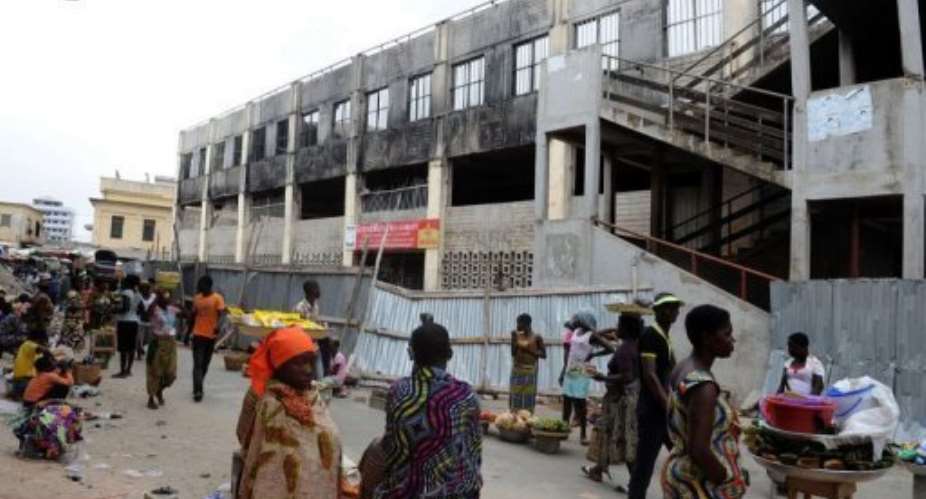LOME (AFP) - Suspicious fires at two major markets in Togo have fanned political flames and led to the arrest of opposition members ahead of Thursday's parliamentary polls, the latest chapter in the country's unsteady transition to democracy.
The market that was once the biggest in Togo's capital sits in ashes, blackened remains of brightly coloured wraps and smashed pottery scattered on the floor, while just outside conspiracy theories spread.
"We don't know!" a 35-year-old woman selling handbags outside the ruins of the two-storey concrete market said when asked who was responsible for the fire, adding that she lost some $16,000 in goods in the flames.
Others around her accused politicians and alleged that firefighters failed to respond.
Suspicious fires that burnt the Adawlato market in Lome as well as another major market in Kara in the north in the dead of night in January have played an important role in Thursday's elections in this west African nation.
They have also served as a reminder of the unsteady journey toward fully fledged democracy in the country of six million people run by the same family for more than four decades.
The fires have resulted in the arrest of some 35 people, most of them opposition members, some of whom are candidates in Thursday's vote.
Opposition members have denounced the arrests and called for an independent probe, calling the blaze an attempt by President Faure Gnassingbe's government to discredit them and distract attention from real issues.
In recent weeks, the opposition has obtained the release of 13 of its members as well as other concessions, resulting in a decision to drop threats of an election boycott and run in the polls.
But the truth behind the fires remains unclear at best, and the government says those released from jail will still face the brunt of the law if they are eventually found guilty.
The government minister for territorial administration said those accused would be presumed innocent, but added that the fires occurred at a time when protests were calling for Gnassingbe's departure.
"Maybe the regime did not collapse, but the markets did collapse," Gilbert Bawara told AFP. "So I'm saying that it is perhaps a chance coincidence, but we need to know what happened."
Jean Pierre Fabre, the country's most prominent opposition leader who has been accused but not arrested as part of the probe into the fires, demanded an independent investigation.
"Everyone must be freed," he told AFP as he arrived at a rally on Tuesday.
The fires came amid a series of protests organised by a coalition of opposition and civil society groups known as Let's Save Togo, which had demanded sweeping electoral reforms ahead of parliamentary polls.
Many of the protests were dispersed by security forces firing tear gas, and the elections initially due in October 2012 were delayed for months.
Negotiations in the lead up to the polls resulted in the opposition dropping boycott threats and running in the elections, though it says it continues to have concerns over potential vote fraud.
The deal reached allows the opposition to have representatives in polling places, while 13 people held over the fires have been released, including five candidates.
The elections represent the latest chapter in the impoverished country's transition toward democracy after the iron-fisted rule of Gnassingbe Eyadema from 1967 until his death in 2005.
The military installed his son Faure Gnassingbe as president after his death, and he has since won elections in 2005 and 2010 that the opposition claims were fraudulent.
Presidential elections in 2005 were marred by deadly violence, but observers called the 2010 vote significantly improved.
The last legislative elections in 2007 were also seen as a step forward by observers. Gnassingbe's party, formerly the RPT and now UNIR, won 50 of 81 seats.
Ninety-one seats are up for grabs on Thursday, and some analysts have said the opposition faces a difficult job in winning enough to gain real power despite persistent concerns over unemployment.
Meanwhile, incidents such as the market fires and the uncertainty surrounding them continue to raise concerns despite the government's stated commitment to reforms.
Kofi Yamgnane, a French-Togolese opposition politician currently based in France, accused the government of using the fires as a decoy.
"Then time is spent negotiating the release of opposition members and real problems are not addressed," he said.





 Lay KPMG audit report on SML-GRA contract before Parliament – Isaac Adongo tells...
Lay KPMG audit report on SML-GRA contract before Parliament – Isaac Adongo tells...
 Supervisor remanded for stabbing businessman with broken bottle and screwdriver
Supervisor remanded for stabbing businessman with broken bottle and screwdriver
 NDC watching EC and NPP closely on Returning Officer recruitment — Omane Boamah
NDC watching EC and NPP closely on Returning Officer recruitment — Omane Boamah
 Your decision to contest for president again is pathetic – Annoh-Dompreh blasts ...
Your decision to contest for president again is pathetic – Annoh-Dompreh blasts ...
 Election 2024: Security agencies ready to keep peace and secure the country — IG...
Election 2024: Security agencies ready to keep peace and secure the country — IG...
 People no longer place value in public basic schools; new uniforms, painting wil...
People no longer place value in public basic schools; new uniforms, painting wil...
 'Comedian' Paul Adom Otchere needs help – Sulemana Braimah
'Comedian' Paul Adom Otchere needs help – Sulemana Braimah
 Ejisu by-election: Only 33% of voters can be swayed by inducement — Global InfoA...
Ejisu by-election: Only 33% of voters can be swayed by inducement — Global InfoA...
 Minority will expose the beneficial owners of SML, recover funds paid to company...
Minority will expose the beneficial owners of SML, recover funds paid to company...
 Prof. Opoku-Agyemang has ‘decapitated’ the NPP’s strategies; don’t take them ser...
Prof. Opoku-Agyemang has ‘decapitated’ the NPP’s strategies; don’t take them ser...
